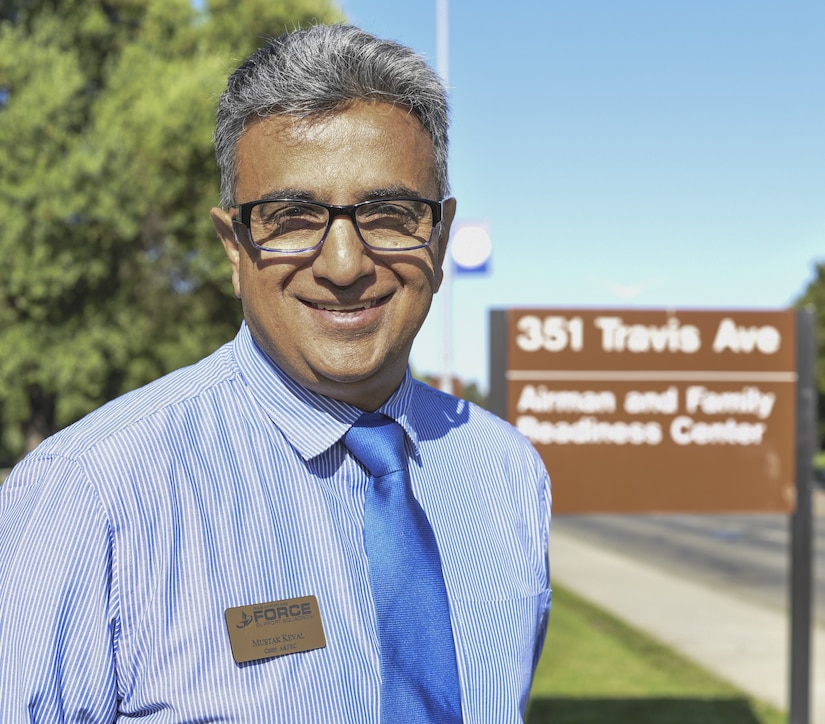By Air Force Staff Sgt. Amber Carter, 60th Air Mobility Wing
TRAVIS AIR FORCE BASE, Calif. -- “We really are a nation of
immigrants,” said Mustak Keval, the 60th Force Support Squadron Airman and
Family Readiness Center’s flight chief here. “I am driven by my need to give
back because of what my family and I owe this great nation for taking us in.”
Keval joined the Air Force in 1980 to serve the country that
provided a safe place for his family to grow and thrive after becoming a
Ugandan refugee when he was 13 years old.
In 1972, a military coup d’etat was staged by Idi Amin Dada,
a violent dictator who forced non-Africans to leave the country on a short
deadline. Amin launched a ruthless eight-year regime in which an estimated
300,000 civilians were massacred.
Military Coup
“When the military coup happened, he initially started by
expelling all of the Europeans -- mostly British,” Keval said. “Then he
proceeded to expel anyone who was not African and gave us 90 days to get out.”
Keval’s grandfather emigrated from India to Africa in the
early 1900’s. Keval’s mother was born in Ethiopia, and his father was born in
Kenya. Their family packed up shortly after his birth in Ethiopia and moved to
Uganda, where they settled down.
“We were Ugandan citizens,” he said. “We all went to school
there, my father owned various businesses and we were established Ugandan
citizens. So, when we were kicked out of the country, we were considered
stateless.”
Keval’s large family with 11 children had to quickly find a
country that would accept political refugees and had space for all of them.
“We ended up in a camp in Naples, Italy,” he said. “I
remember it being crowded and I remember a temperature change, since we had
moved from a tropical environment to the cold of Italy. I remember feeling
uncertain about where we would end up and at the same time, relieved that we
had escaped the impending violence in Uganda.
The refugee camp became a temporary home for Keval’s family.
“We established a community [during the 40 days at the
camp], but we were all awaiting our fate to see where we would end up,” he
said.
Coming to America
While at the refugee camp, the Kevals were sponsored by the
Lutheran World Federation and originally thought they might end up in Pakistan,
but a little town in middle America banded together to help.
“The churches in the small town of Cedarburg, Wisconsin, got
together and decided to sponsor us by dividing us among three different
churches; Catholic, Lutheran and Methodist,” he said. “It was really amazing
what that community did for us. We were all in the same city and they would
make an effort to ensure we could see each other at least once or twice a
month. We assimilated very quickly.”
The churches helped his mother by providing a tutor for her
to learn English and she began work at a McDonald’s, while his dad worked at a
factory. After attending school, Keval wanted to return the favor and decided
that serving in the Air Force would be the best way to give back to the
community.
“This community wrapped their arms around us,” he said. “My
brother, Azad, and I both joined and served until retirement. He retired as a
lieutenant colonel.”
Air Force Service
During Keval’s 22 years in the Air Force, he was a military
police officer, retrained into social actions and dealt with alcohol abuse
awareness, served as a postal worker overseas and retired in 2001 as the
noncommissioned office-in-charge of the Airman and Family Readiness Center
here.
“I had no obstacles while serving,” he said. “In our Air
Force, if you work hard, you can achieve anything.”
He then began life outside of the military, but found
himself returning to the base often.
“It was so different being out,” he said. “I missed the
camaraderie and the military environment. I missed serving the country and it
felt like a magnet was pulling me back.”
Remembering how much he loved working at the AFRC, he applied
for a job in 2004 and has been working with the AFRC ever since, where he
provides relocation and transition assistance, financial assistance, resilience
training as well as multiple other programs for airmen and their families.
Hard Worker
“He is the epitome of the Air Force core values,” said Brian
Floyd, 60th Force Support Squadron deputy director. “His integrity is beyond
reproach and his abilities as a supervisor, employee and leader are some of the
best I have seen in anyone I have worked with over my 38-year career. He will
work nights, weekends and extended hours without ever complaining and, instead,
takes pride in getting the job done the right way no matter what it takes.
“Mustak has a great way of working with each of his
employees,” he continued. “He is very keen of their strengths and weaknesses
and he knows how to get the most out of them as well as instill pride in them
for the important work they do.”
Keval said he wants to continue serving the country he
loves.
“Every year that I have served, I am grateful,” he said. “If
there is any country in the world where a person has a chance, it’s this one.
There is so much good here. My future plan is to keep working with military
families, which is what drives me. I love helping our airmen and serving them
is truly what I love doing.”








No comments:
Post a Comment